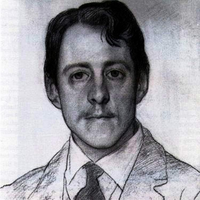The Dream’house
Often we talk of the house that we will build
For airier and less jostled days than these
We chafe in, and send Fancy roaming wide
Down western valleys with a choosing eye
To hover upon this nook or on that,
And let the mind, like fingers pressing clay,
Shape and reshape the mould of an old desire,
Spur jogging Time, conjure slow years to days,
Until tall trees, like those far fabled walls,
Rise visibly to the mind’s music. Here
We scoop a terrace under hanging woods
Upon the generous slope of a green hill
That gazes over alluring distances;
Listen to our merry children at their play,
And see the shadow lengthen from our roof
On plots of garden. Fancy, busy still,
Sows colours for the seasons in those plots,
And matches or contrasts the chosen leaves
That are to shade our saunters; the clean boughs
Of aromatic walnut; the wild crab
With, after snows of blossom, fiery fruit;
And beeches of a grander race beyond them
Withdrawing into uninvaded wood;
But, farther down, our orchard falls to where
The stream makes a live murmur all day long.
Man is a builder born: not for the shell
That makes him armour against stripping wind
And frost and darkness; for befriending roof
And walls to sally from, a bread—getter.
No, but as out of mere unmeaning sound
And the wild silence he has made himself
Marvellous words and the order of sweet speech,
Breathing and singing syllables, that move
Out of the caverns of his heart like waves
Into the world beyond discovery; so
Builds he, projecting memory and strong hope
And dear and dark experience into stone
And the warm earth he digs in and reshapes,
Dyeing them human, and with a subtle touch
Discovering far kinships in the sky
And the altering season, till the very cloud
Brings its own shadow as to familiar haunts,
And the sun rests as on a place it sought.
Earth also as with a soft step unperceived
Draws from her ancient silence nearer him,
Sending wild birds to nest beneath his eaves
Or to shake songs about him as he walks,—
Shy friends, the airy playmates of his joy.
Caesars may hoist their towers and heave their walls
Into a stark magnificence, impose
The aggrandised image of themselves, as trumpets
Shattering stillness. We’ll not envy them,
While there’s a garden to companion us
And earth to meet us with her gentle moss
Upon our own walls. They may entertain
Prodigally a thousand guests unpleased;
But we have always one guest that is ever
Lovely and gracious and acceptable,
Light. As I lay upon a hill—top’s turf
I watched the wide light filling the round air
And I was filled with its felicity.
O the carriage of the light among the corn
When the glory of the wind dishevels it!
How it filters into the dim domes of trees
Spilt down their green height, shadows dropping gold!
How beautiful its way upon the hills
At morning and at evening, when the blades
Of grass blow luminous, every little blade!
How the flowers drink it, happy to the roots!
This lovely guest is ours to lodge; and we
Will build for it escapes and entrances
And corners to waylay the early beam
And keep its last of lingering: here to accept
Its royalty of fullness; there to catch
In dusky cool one lustre on the floor
Doubling itself in echoed radiances
Mellow as an old golden wine, on wall
And ceiling: oh, how gentle a touch it has
On choice books, and smooth—burnished wood, in such
Human captivity! When the winds roar over,
What sudden splendours toss into our peace
With reappearing victories! O the glory
Of morning through a doorway on the hair,
Neck, arms, young movements of a laughing child!
O mystery of brightness when we wake
In the night—hush and see upon the blind
The trembling of the shadow of a tree
Kissed by the moon, that from the buried light
Wooes ghostliness of beauty, and receives
And whispers it to all the world asleep.
Whatever it be made of, this dreamed home
Upon a hill, I know not in what vale,
Shall be a little palace for the light
To stray and sleep in and be blest for it.
So thought I: then I thought, O my dear Love,
Surely I am that house, and you the light.

